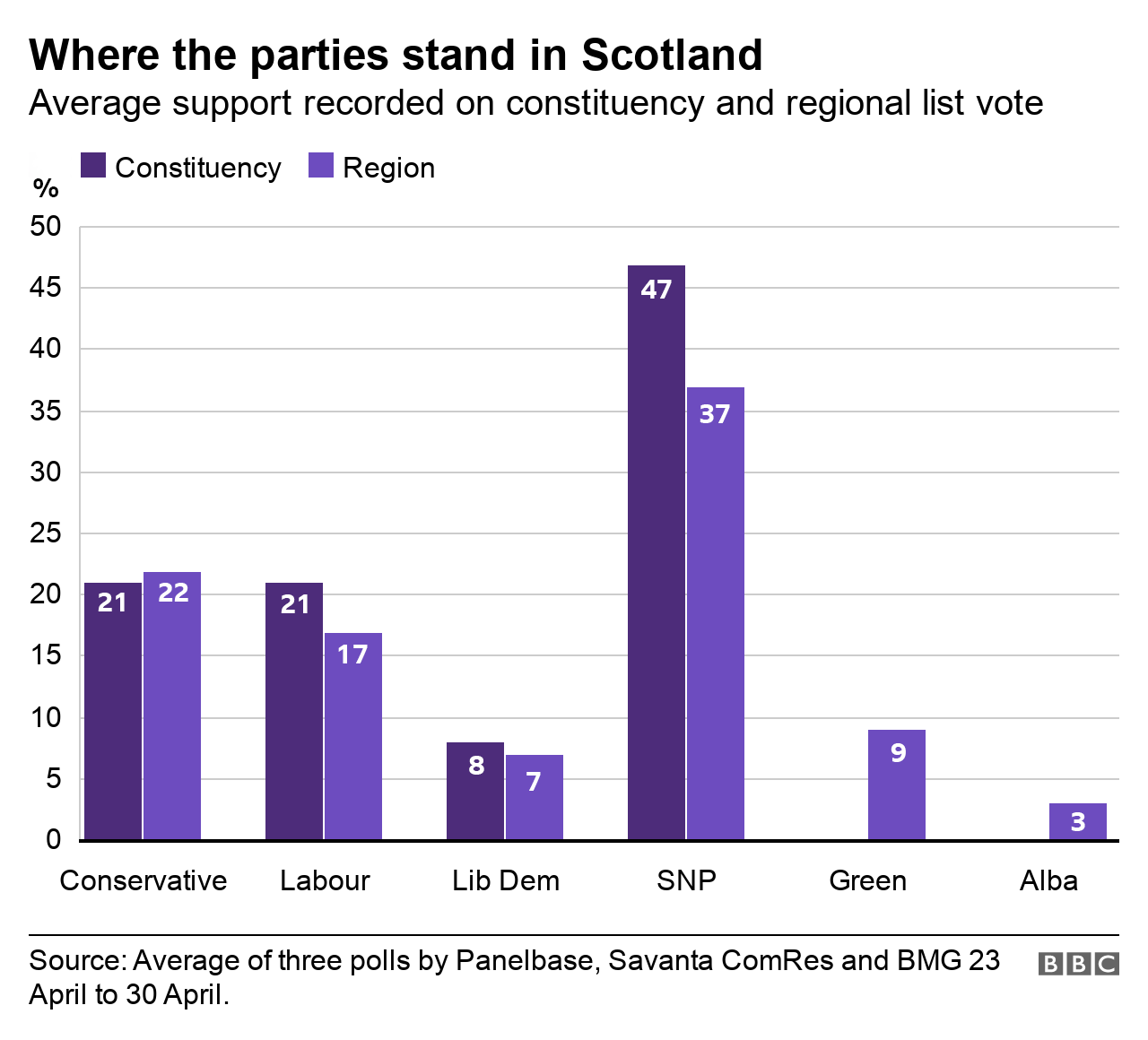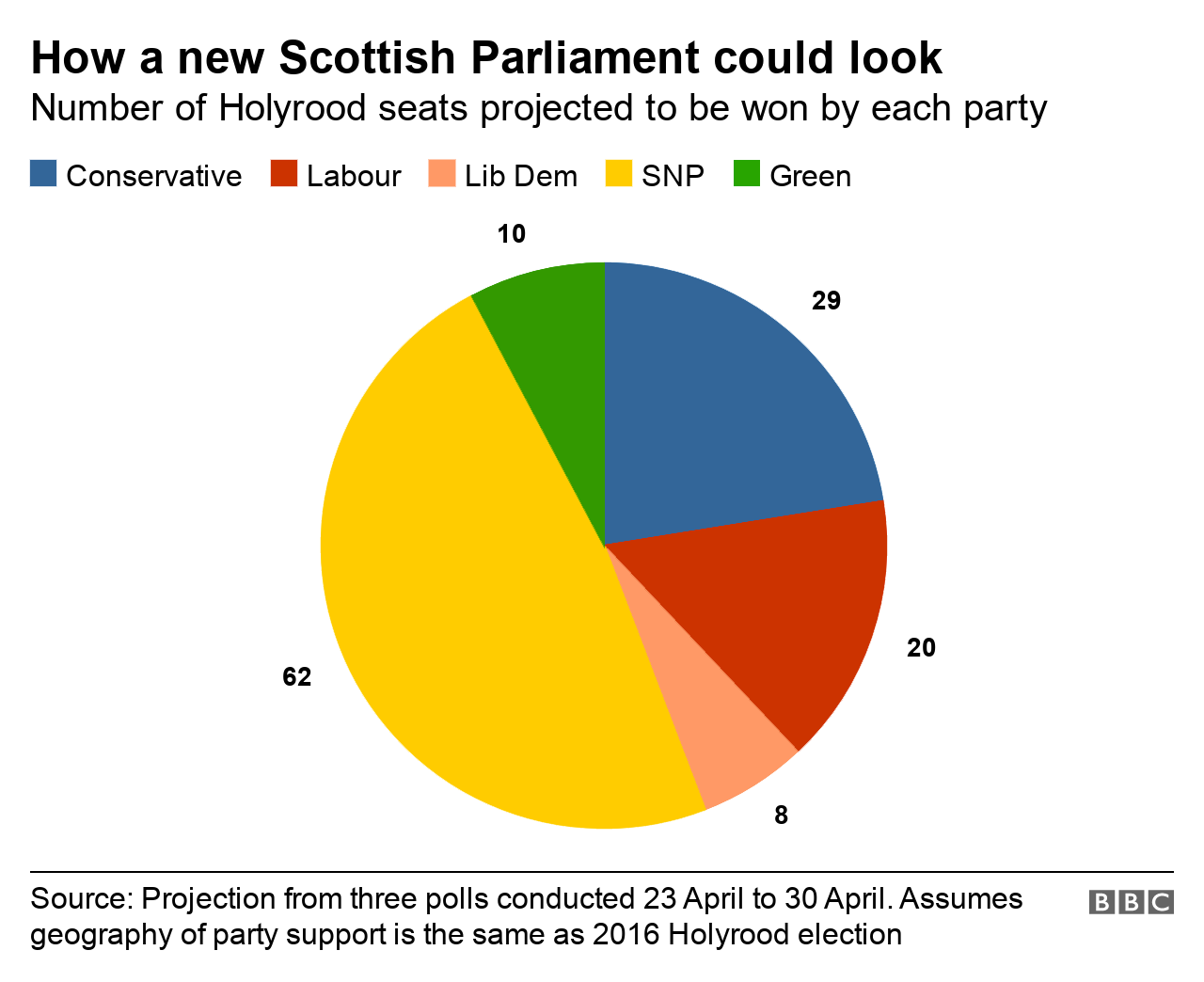Scottish election 2021: Has the campaign changed voters' minds?
- Published

The politicians have spent the last six weeks trying to persuade us to change our minds and vote for them.
On Tuesday, with just 48 hours to go, the five main party leaders have a final chance as they face off in the last of the televised debates.
However, they face a formidable task. The latest polls suggest that relatively few of us have decided during the campaign to switch parties.
In the past week three companies have published new polls. In each case they also polled in the first half of March.
These polls therefore give us a glimpse of how much party support has gone up and down during the course of the campaign.
The current position averaged across the three polls is shown in the following graph.

It shows that the SNP are well ahead, Conservative and Labour are neck-and-neck on the constituency vote, and the Greens are seemingly heading for a record vote on the regional ballot - leaving the Liberal Democrats in fifth place.
This picture is almost exactly the same as it was in early March. In almost every case a party's average rating in the three latest polls is no more than one point different from what it was then.
The one exception is the SNP's list vote. At 37%, this is no less than four points down on the party's standing in March.
But that was before Alex Salmond announced at the end of March that he was heading up the pro-independence Alba Party, which has been attempting to persuade SNP constituency voters to back it on the list.
The former first minister's party is running at 3% on average, much as it has done throughout the campaign.

SIGN UP FOR SCOTLAND ALERTS: Get extra updates on BBC election coverage

What are the parties promising you?

Use our concise manifesto guide to compare where the parties stand on key issues like Covid-19, independence and the environment.

Indeed, although few voters have changed their minds, quite a few appear willing to vote differently on the two ballots.
Only around three-quarters of SNP constituency voters say they will back the party on the list.
Seven per cent are switching to Alba - but the biggest movement is to the Greens, who are scooping up one in eight SNP constituency supporters.
However, it is Labour voters who are proving the least loyal on the regional ballot. Only two-thirds of the party's constituency supporters are backing it on the list.

How does the Scottish voting system work?
Election 2021: How does Scotland's voting system work?
In the Scottish election people have two votes, one for a constituency MSP (like in the UK general election) and another for the regional ballot, often referred to as the "list vote".
The list vote is usually for a party rather than an individual.
The parties are then allocated a number of MSPs depending on how many votes they receive - once the number of constituencies already won in that region is taken into account - to make the overall result more proportional.
There are eight electoral regions, each with seven regional MSPs.

All the other parties are benefitting to some degree from this movement - but the biggest beneficiaries by far are the Conservatives.
No less than 15% of those backing Labour on the constituency ballot are supporting the Conservatives on the list.
This, above all, explains why Labour is as much as five points behind the Conservatives on the list vote, even though the two parties are neck-and-neck in the constituencies.
And when it comes to Labour's prospects for winning seats, it is the list vote that will matter. As our second graph shows, the latest polls suggest the party could be left with just 20 seats, nine fewer than the Conservatives and four down on the party's tally in 2016.

However, Labour are not the only party for whom the outcome of the election could prove something of a disappointment. The latest polls suggest that the SNP's chances of winning an overall majority remain in the balance.
Our latest projection suggests they could be a few seats short.
But just a point or two of extra support on the constituency vote could be enough for the party win an overall majority.
They may have found it difficult to persuade us to change our minds, but all the party leaders still have every incentive to keep on trying.
John Curtice is Professor of Politics, Strathclyde University, and Senior Research Fellow, ScotCen Social Research.

POLICIES: Who should I vote for?
CANDIDATES: Who can I vote for in my area?
PODLITICAL: Updates from the campaign
